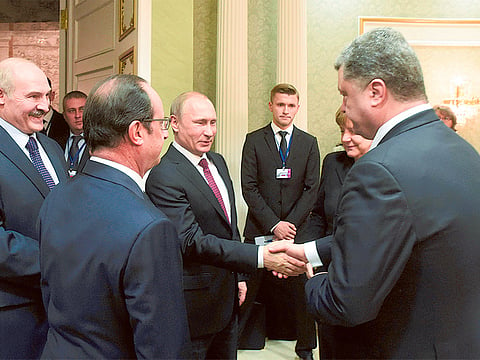World media watch: Ukraine agreement no victory for Kiev or West
International media believe the Minsk peace deal is more visible for its fragility than its tenacity

The new Ukraine peace agreement reached amidst intense international scrutiny last week is more visible for its fragility than its tenacity, says the international media. Only time will tell who the real winner is: Russia or Ukraine.
The Toronto Star believes Russia has walked away from the deal the richer for it. “Even if it survives and eases the violence, the sad reality [of the new peace agreement brokered for Ukraine] is that this agreement goes a long way toward entrenching Moscow’s influence in the eastern regions of Ukraine,” says its editorial. “The reckless adventure that began with Russia’s annexation of Crimea almost a year ago continues. A sovereign nation’s territorial integrity remains compromised and international law remains broken.
“That said, the new peace pact is probably the best that could be achieved given Ukraine’s unfortunate battlefield circumstances.
“It won’t take long to know whether the accord holds. No wonder German Chancellor Angela Merkel described the deal she brokered as offering just ‘a glimmer of hope’. That’s hardly a ringing expression of confidence in future peace.”
The Globe and Mail too has similar concerns. “How much more of Ukraine does Vladimir Putin want?,” asks its editorial. “Crimea, of course, has already been effectively annexed. Now, the second Minsk agreement, signed last week, implicitly recognises Russia’s hold on ‘particular districts of the Donetsk and Luhansk oblasts’ in eastern Ukraine. The Russian grip in those areas will be consolidated. And as for the future? The best hope is that Putin will not push further.
“The Minsk agreement is no victory for Ukraine, or the West. As part of the agreement, Kiev has promised to resume sending pension cheques, welfare payments, and government salaries to the districts under the militants’ control. In return, Ukraine will resume management of the nation’s borders — but only if the rebel-held Donetsk and Luhansk areas have special status, with, for example, their own local police forces.
“So the national government in Kiev at least has the leverage of being able to stop sending transfer payments if Russia’s quislings start acting openly as Russian enclaves. But at the same time, the agreement recognises the enclaves as something other than regular parts of Ukraine. That is a win for Putin.”
The Los Angeles Times says that even if this agreement succeeds, questions will linger about whether Russian President Vladimir Putin’s policy of meddling in Russia’s “near abroad” has been a success.
“If Russia is now willing to cease its military subversion in Ukraine in exchange for autonomy for pro-Russian regions, that’s a positive development. It is also, arguably, a vindication of economic sanctions. But, as German Chancellor Angela Merkel said, the agreement offers a ‘glimmer of hope’, not a guarantee, that this conflict will be resolved peacefully.”
The Tribune in India says President Petro Poroshenko’s government will have to maintain a delicate balance between the West and Russia. “Thousands of lives have been lost in the conflict; the rebels want autonomy and will have to be given a certain measure of self-governance; a new constitution will have to be drafted; borders need to be protected. The challenges are many, and perhaps the best thing about the Minsk accord is the low expectations it has generated.”
Ukraine, says the paper, “has learnt to survive and now it needs its survival skills more than ever before.”
The Indian Express believes Russian President Vladimir Putin has won despite all odds. “If [he] appeared cheerful, the reason could be that Russia and the rebels are making tactical gains, with the Ukrainian military having to give up its current line of control and Kiev compelled to introduce a new constitution allowing rebel regions to form their own police, appoint their judges and conduct trade with Russia. But, significantly, the deal upholds Ukrainian sovereignty, with full control of rebel-held areas and the border with Russia set to return to Kiev by the end of 2015, post a full political settlement. Also, the IMF’s $17.5 billion reform package would enable Kiev to reopen banks and transfer pensions to the east. So, Ukraine may be the strategic winner,” it concludes.
Sign up for the Daily Briefing
Get the latest news and updates straight to your inbox



